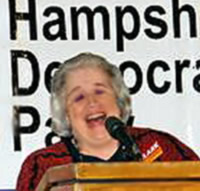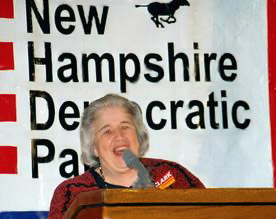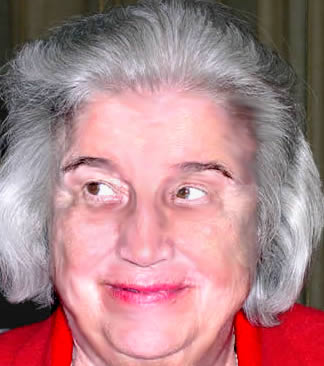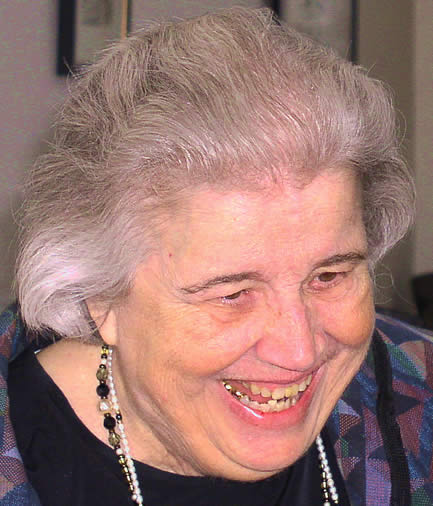view
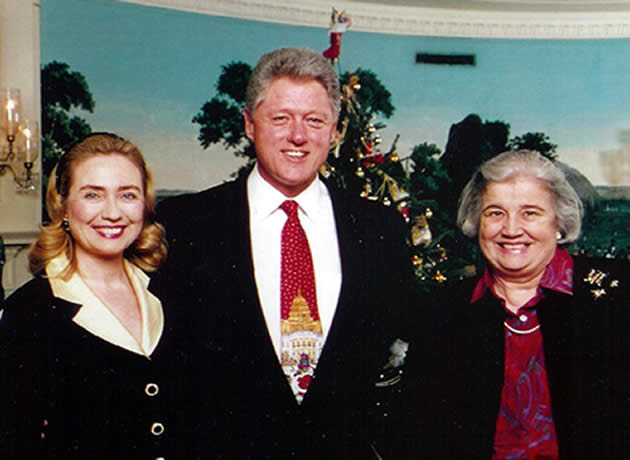
with
the Clintons at the White House
She received the Eleanor Roosevelt Award
at the NH Democratic Party's Jefferson/Jackson dinner, in October 2002.
In
remembrance
Jean Lande Hennessey
1927-2004
"Making
the world a better place"
-
Progressive Actions -
Jean Hennessey's political conversion happened during the 1952 presidential campaign when she started out for Eisenhower over Taft and then fell for Adlai Stevenson, the Democratic candidate. This led to many 'spirited' debates with her father. She was never politically the same again.
During NH primary campaigns, over the last 25 years, most Democratic Presidential candidates have made it a special point to seek her advice, often stopping at her home.
She became politically active, after moving to Hanover NH in 1957, in the League of Women Voters and local government. Hennessey worked to clean up the water pollution in the Connecticut River, and helped create a "Greenbelt" around the town of Hanover. NH Governor King appointed her to several statewide bodies and she was invited to Lady Bird Johnson's White House Conference on Natural Beauty in 1965.
"She became consciously connected with environmental issues," said husband John Hennessey, the former dean of Tuck School.
Hennessey in-formed herself about environmental laws and regulations and, in the process, developed a deep appreciation of the good that government can do for people, her husband said. The scope of her interests widened to include women's and children's issues.
From 1968 to 1977, she helped to build the New Hampshire Charitable Foundation and Affiliated Trusts [NHCF] and served as its first executive director. New Hampshire Charitable Foundation incorporated with funds from the Spaulding-Potter Trusts. During Hennessey's tenure it grew to $5.3 million in assets with grants of $770,000 in 1977. The New Hampshire Charitable Foundation is now one of the country's largest community foundations, with assets in excess of $289 million, NHCF awarded over $17 million in grants, program initiatives and scholarship funds in 2003.
She accepted the Presidency of Women & Foundations / Corporate Philanthropy in 1977. In that same period, she was a board member and chair of the committee on legislation and regulation of the Council on Foundations.
She wanted to challenge New Hampshire's dominant political ethos that emphasizes a small role for government, a position that she felt "left people behind," said John Hennessey. Being a practical woman with natural instincts for working with people, she set out to help strengthen the NH's Democratic Party, friends say. She became a leader in the NH Democratic Party (and was a national Democratic Committeewoman).A common refrain among Democratic activists was, "We'll have to call Jean Hennessey. She'll know what to do," Hancock recalled.
Hennessey never held a statewide elected office herself, preferring to work "behind the scenes". She used her list of 10,000 potential activists and donors to organize support and and raise funds to make the world a better place. "She had a great sense of what needs to be done and the practical, financial means by which it can be accomplished,'' said friend and former State Planner Mary Louise Hancock of Concord.
One of her proudest political victories was the election of Hugh Gallen as NH governor in 1978. She had helped run the Democrat's campaign, and later served as his budget director.
In recognition of her environmental accomplishments President Carter appointed her as the first woman on the International Joint Commission - an independent bi-national organization between the US and Canada as an environmental rule maker and boundary steward, in 1979. She joined the Environmental Studies faculty of Dartmouth College in 1981, and later became Director of Dartmouth's Institute on Canada and the US.
In 1996 she worked to support NH State Senator Jean Shaheen's successful campaign for Governor, and again in 1998 worked for Shaheen (successfully). In the 2002 election campaign she was active, especially for Jeanne Shaheen's Senate campaign (unsuccessfully), and seven Democratic candidates for the NH House (all won). In October 2002, she received the Eleanor Roosevelt Award of the NH Democratic Party, at the Jefferson/Jackson dinner.
She was appointed in 1994 to the Commission for International Environmental Cooperation (NAFTA) as the American Executive Director, in Montreal.
President Clinton appointed her to the Board of Trustees of the Woodrow Wilson International Center for Scholars in 1994 and again in Oct. 1996.
Among her many efforts, for twenty years she was a trustee and chair of the finance committee of the Population Research Center in Princeton. She was chair of the NH Chapter of Nature Conservancy, author of the NH power plant siting act. She also served on the boards of the NH Civil Liberties Foundation, the Environmental Law Institute, the World Environment Center, the Association for Canadian Studies in the United States, the Center for Northern Studies, the NH Commission on the Status of Women, the Planned Parenthood Federation of America, the Montessori School in Hanover, as well as the NH Rhodes Scholar Selection Committee, the Advisory Committee on the Selection of a Federal District Court Judge, and the NH Air Pollution Control Commission.
